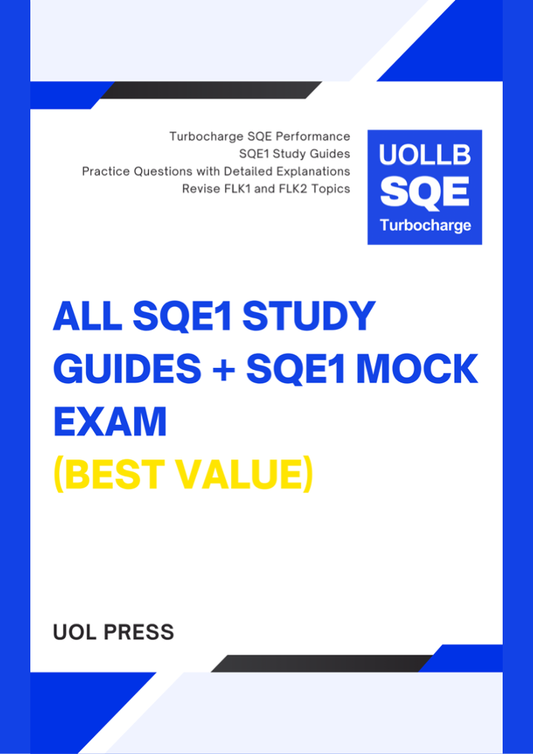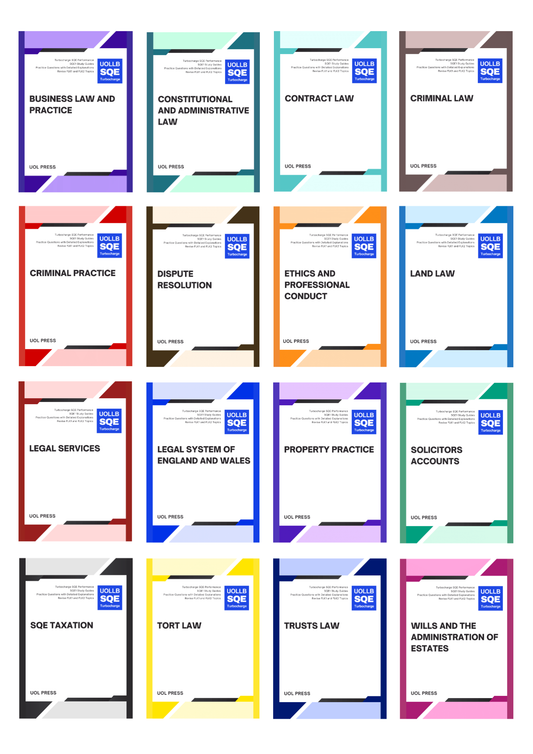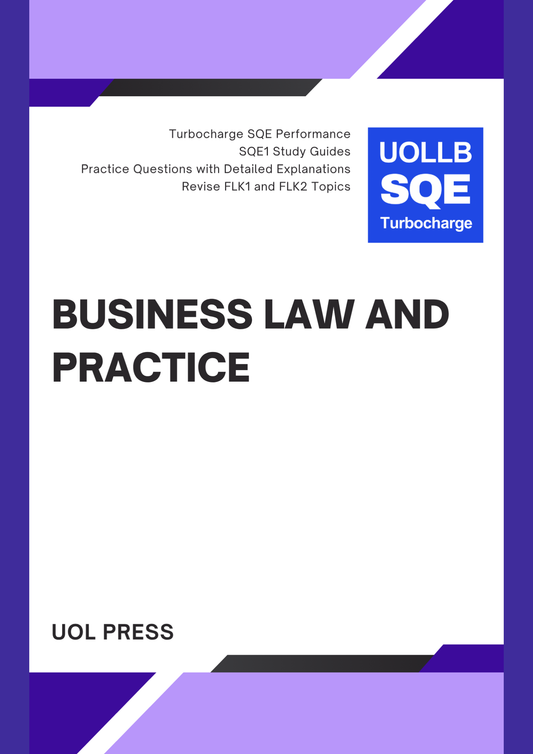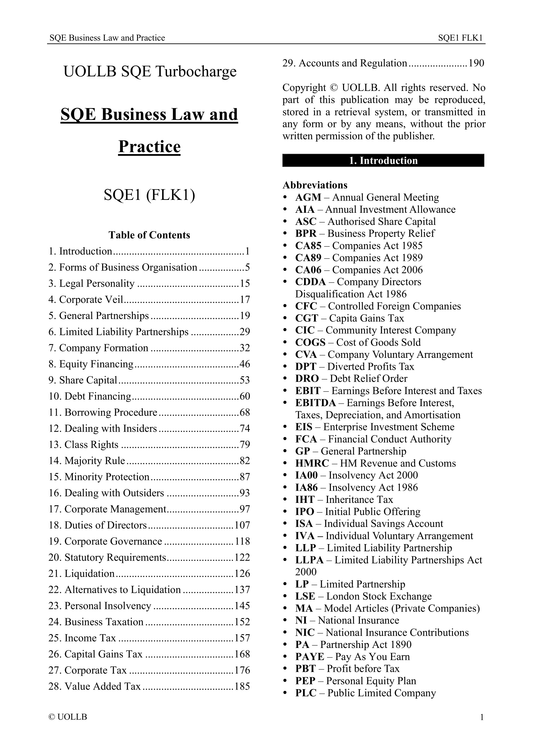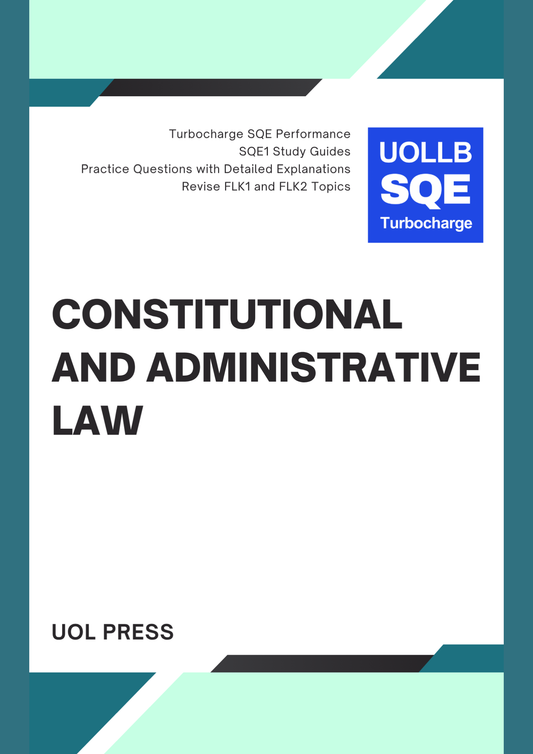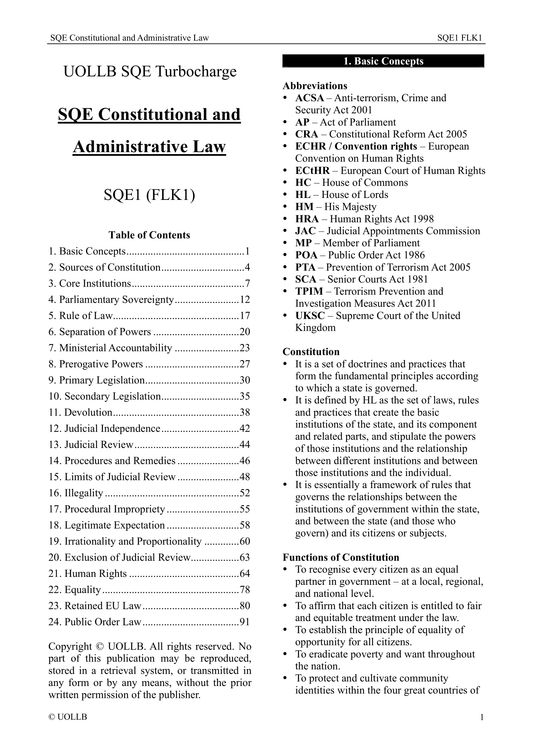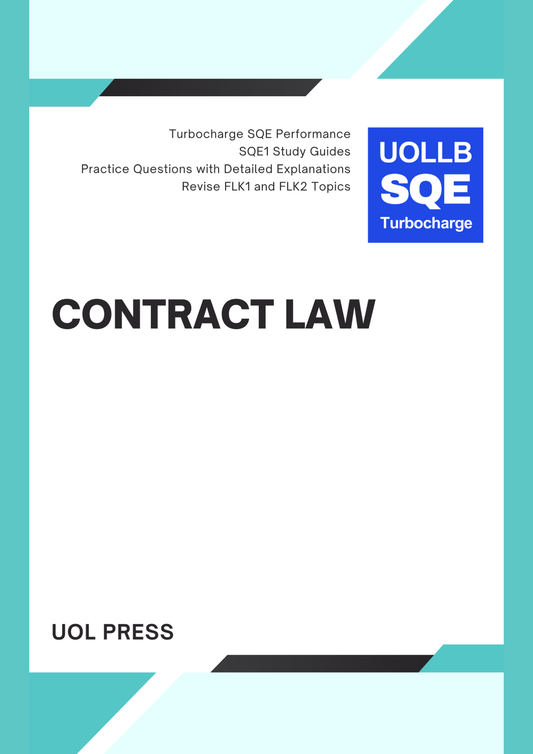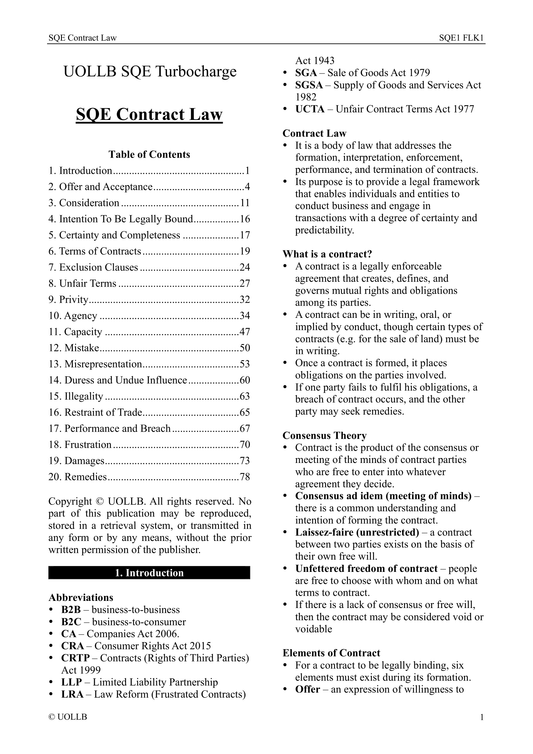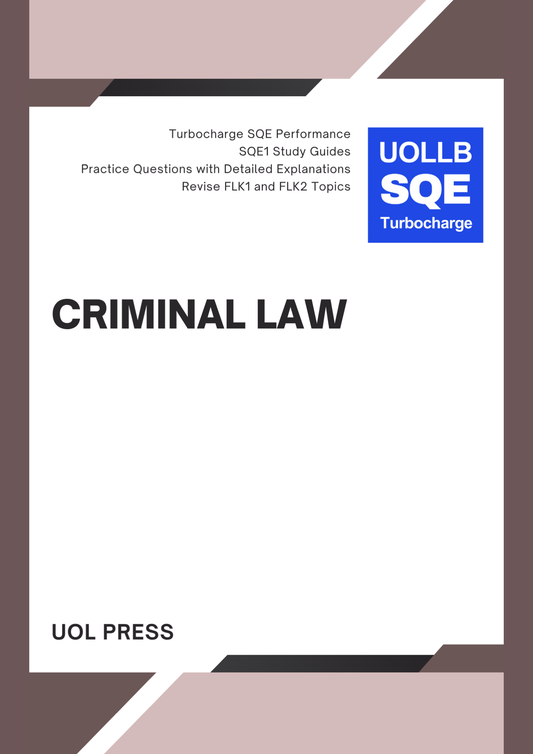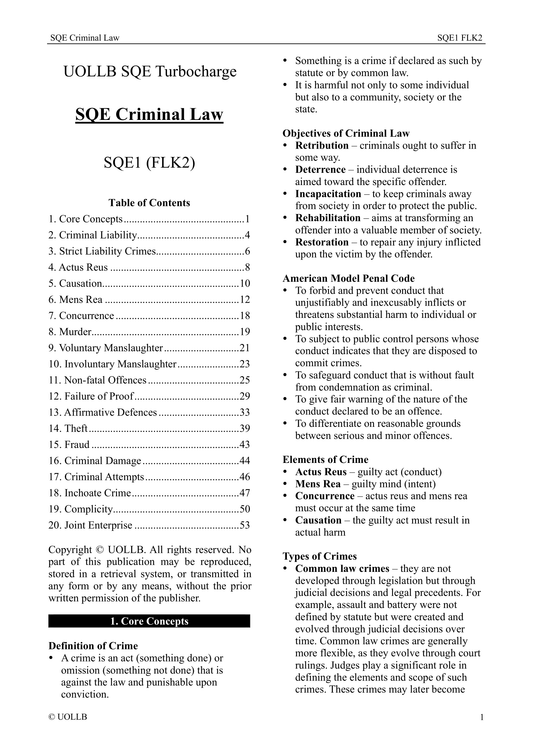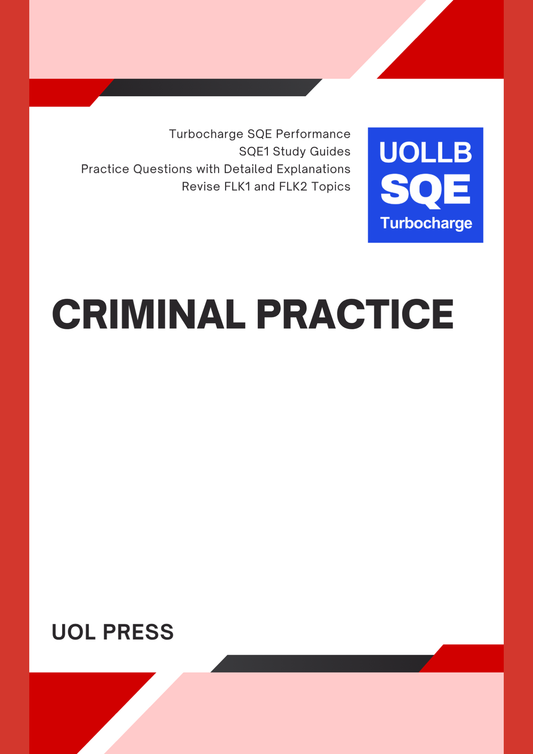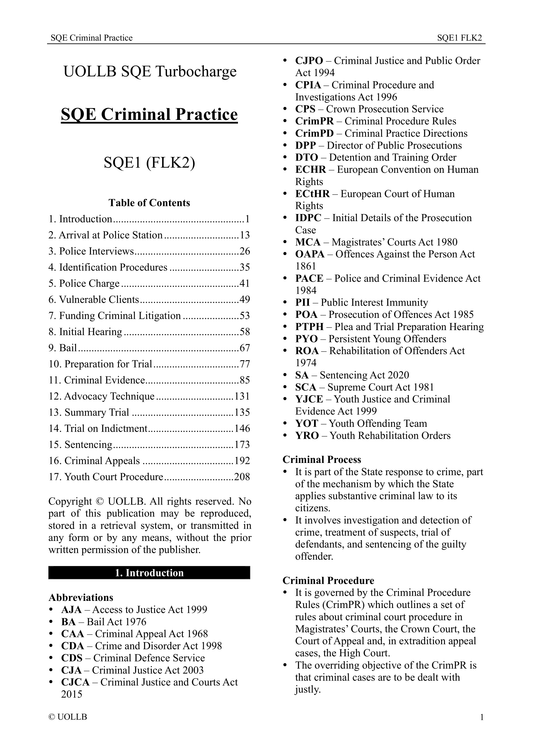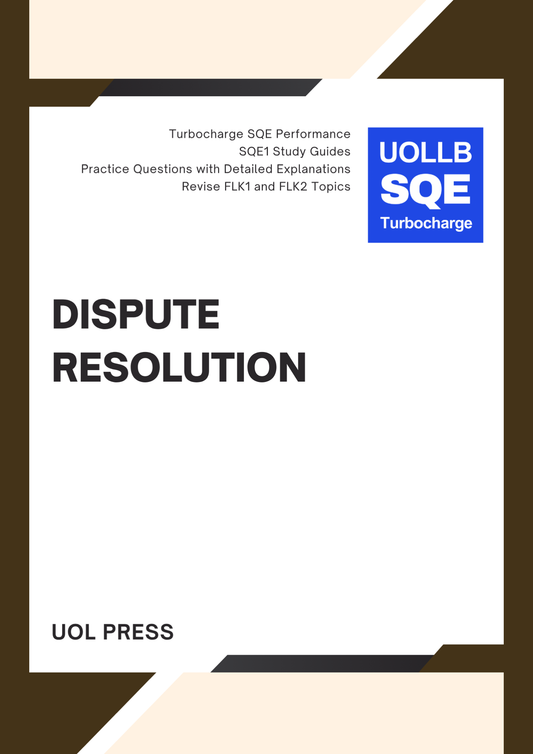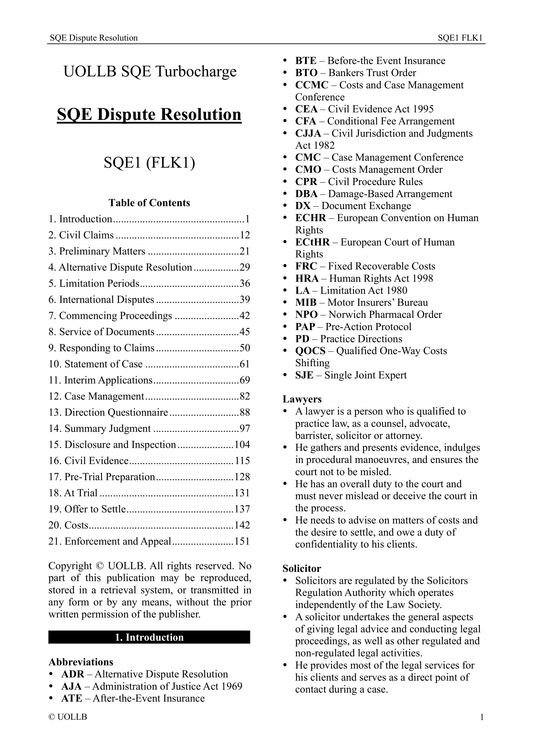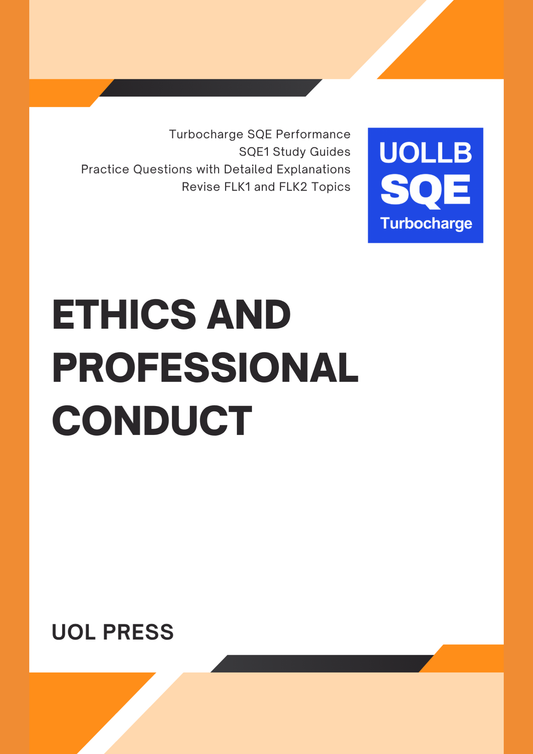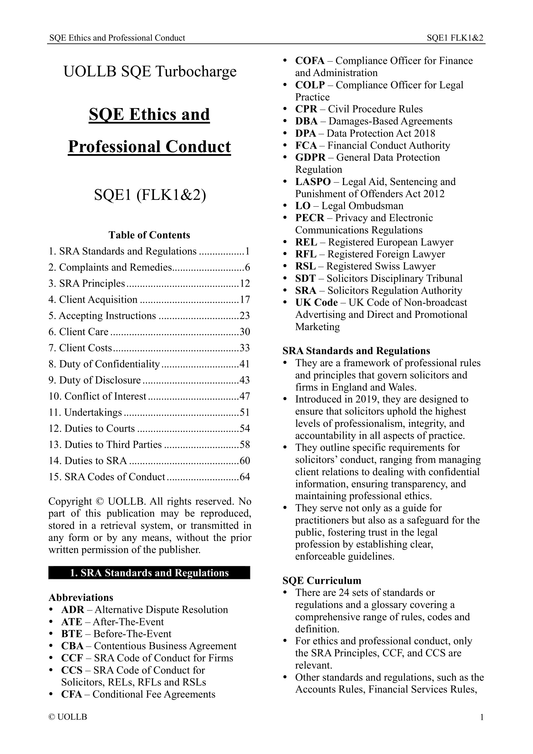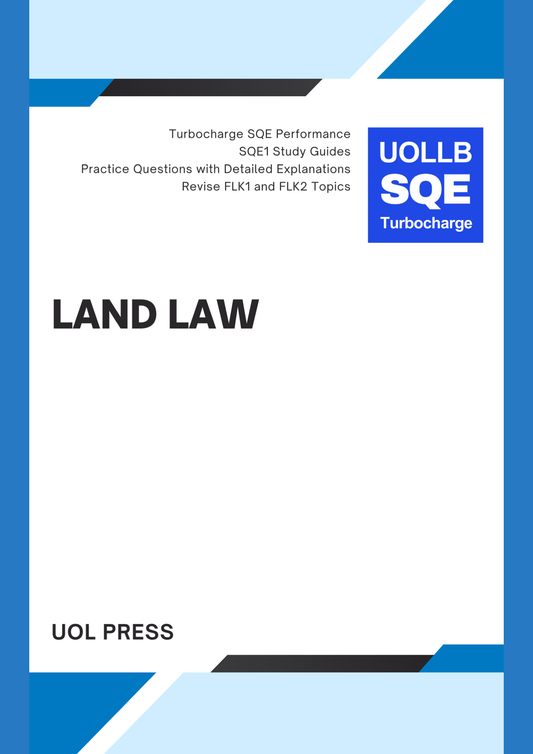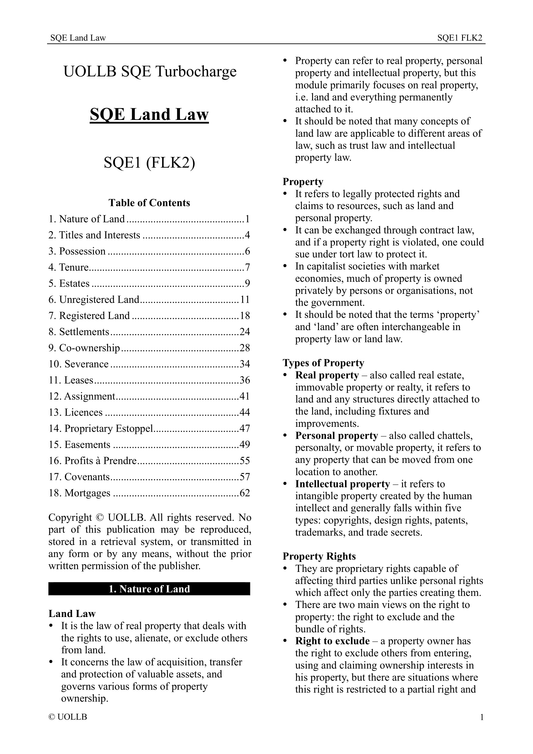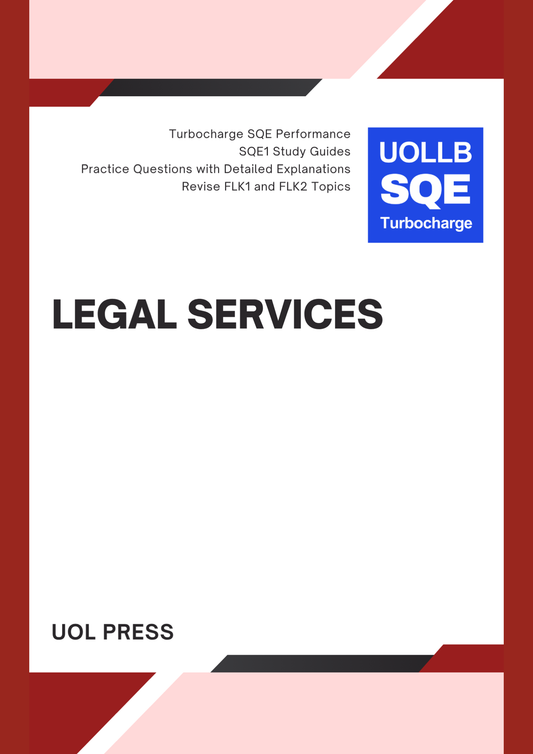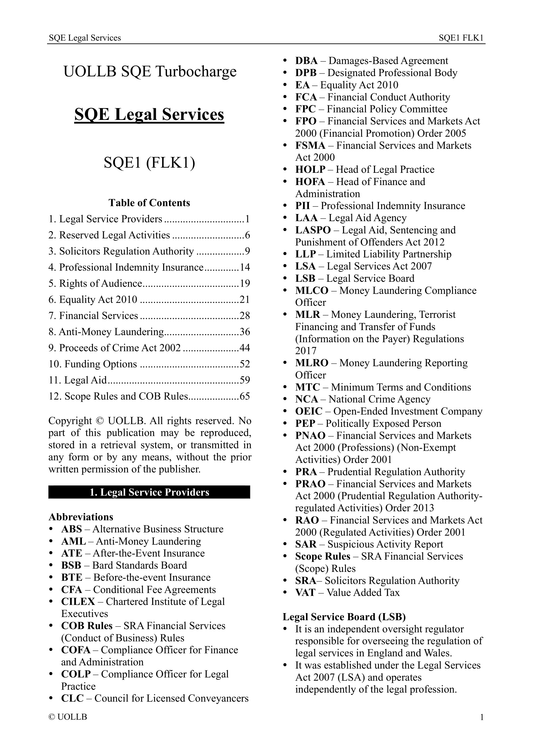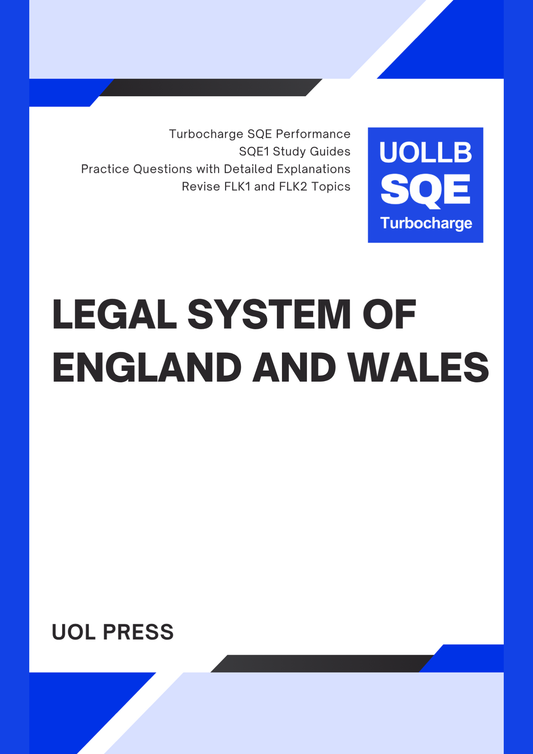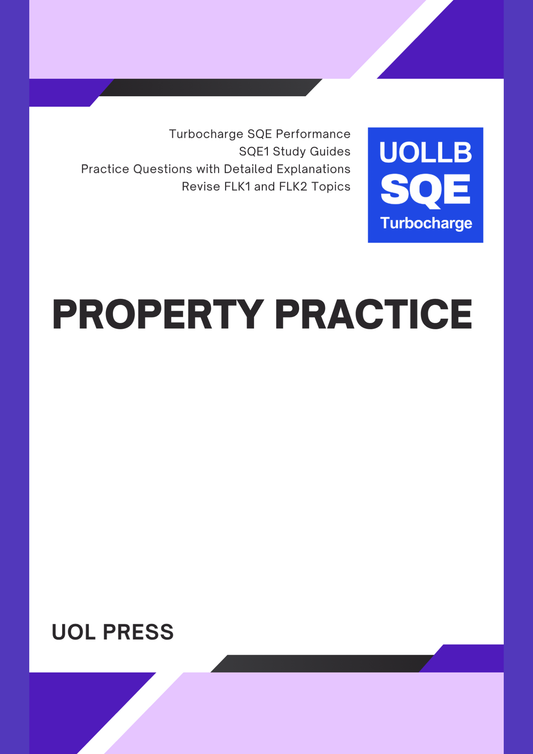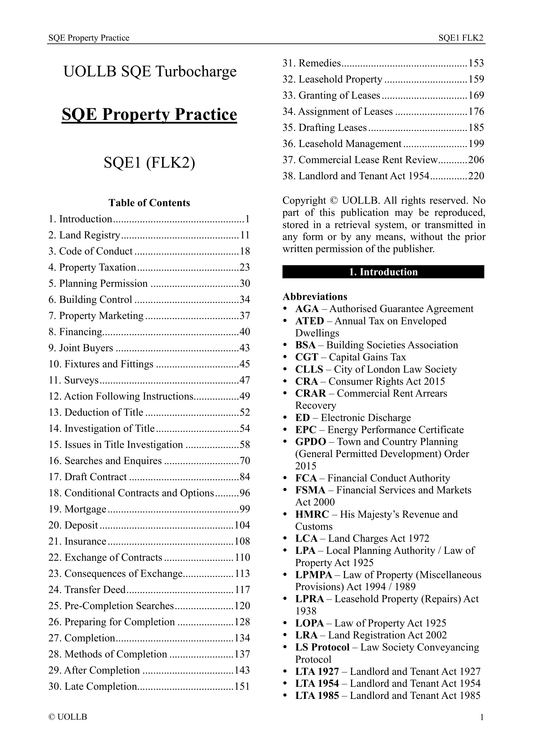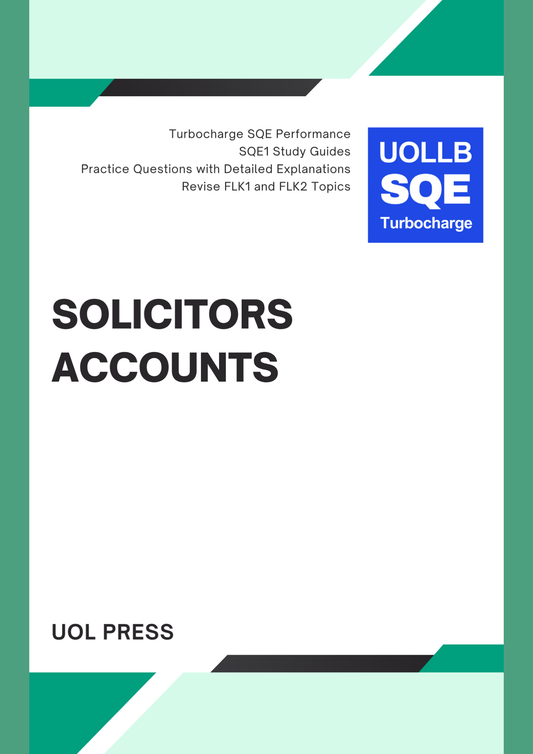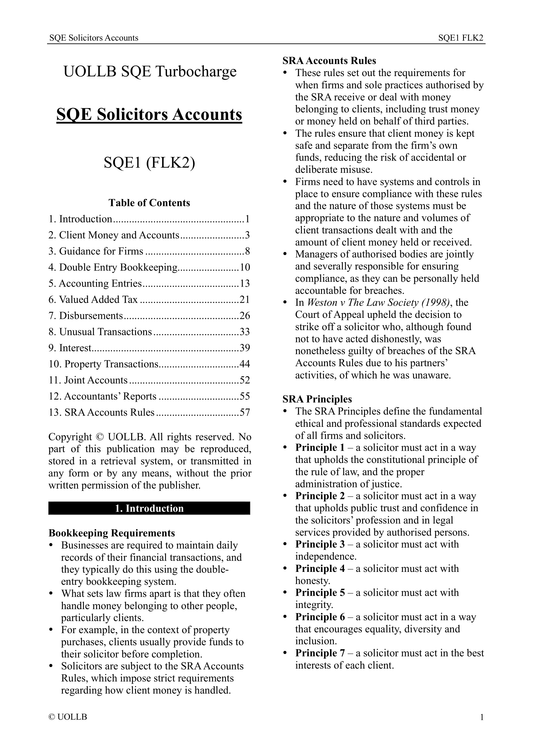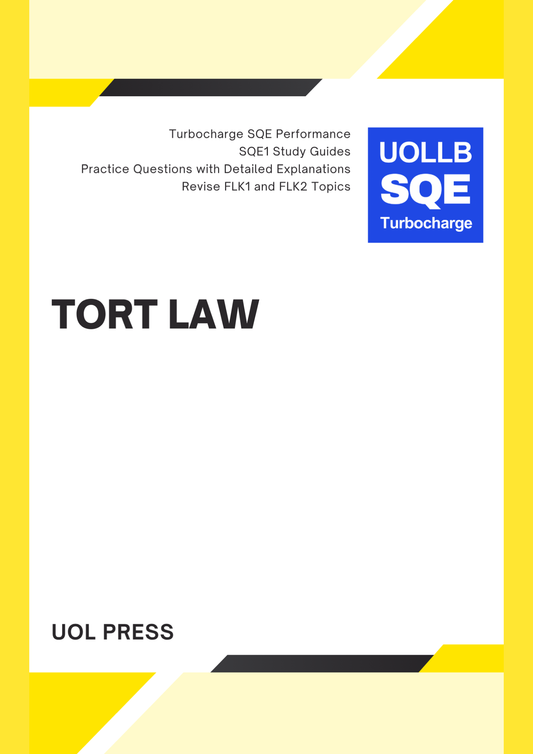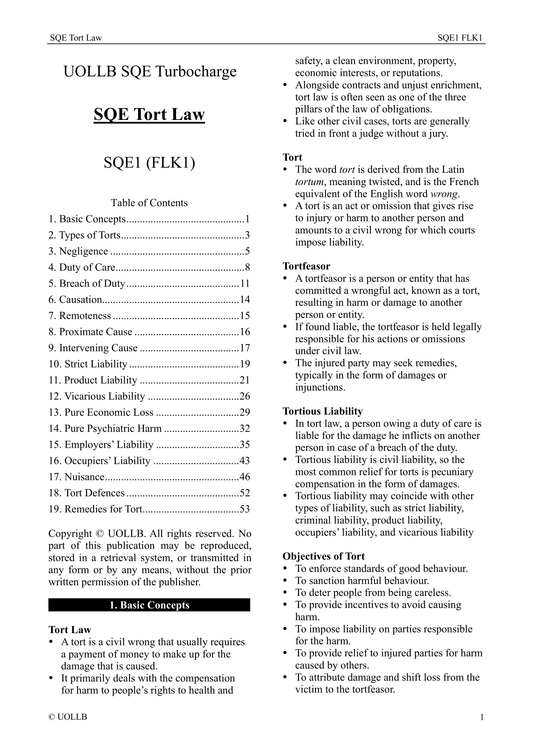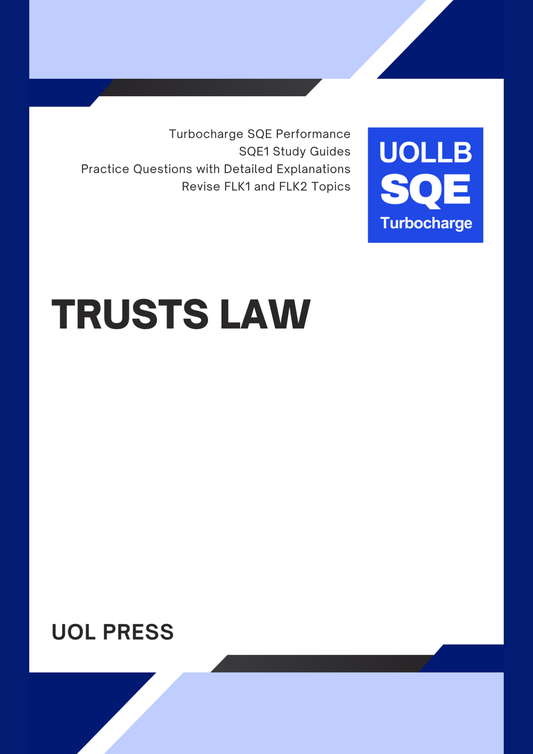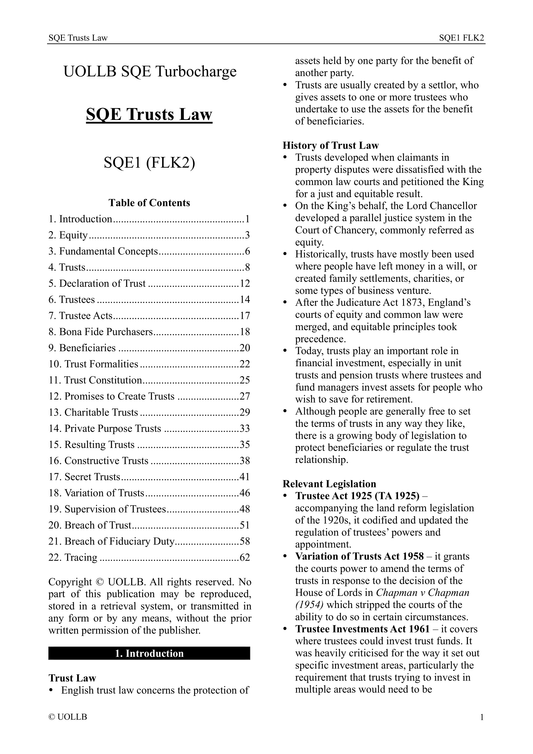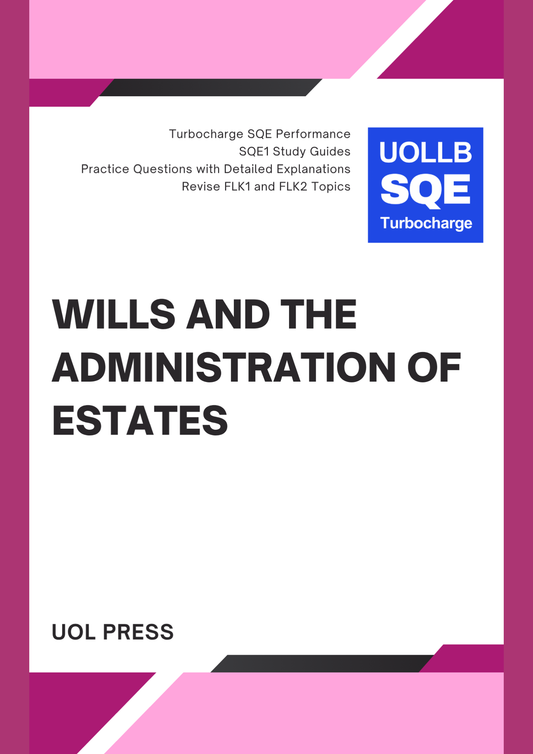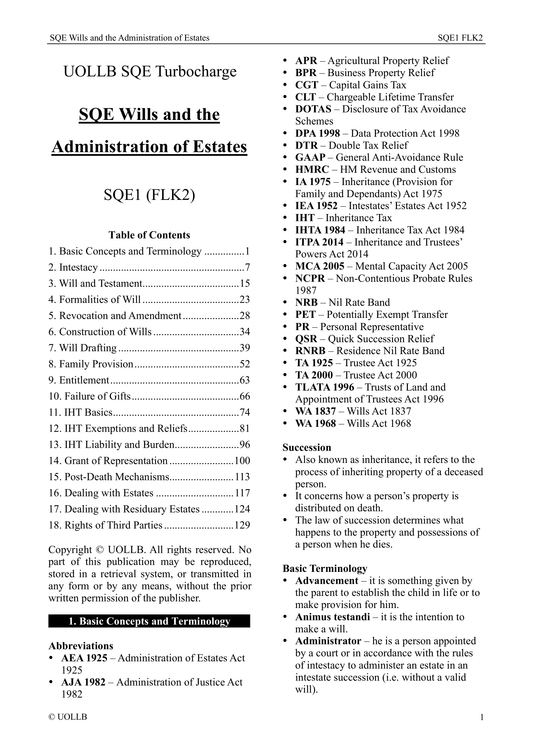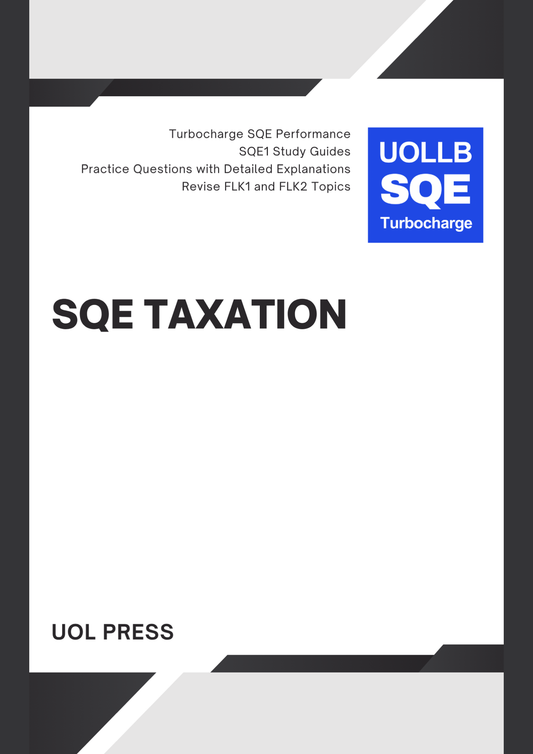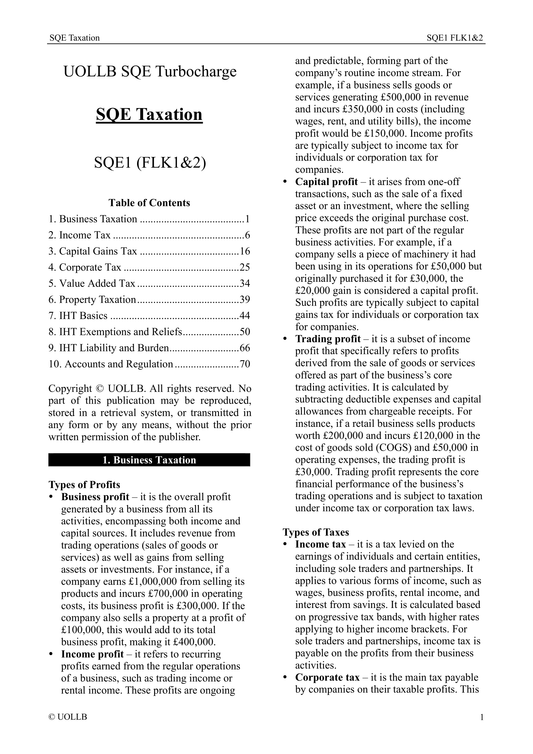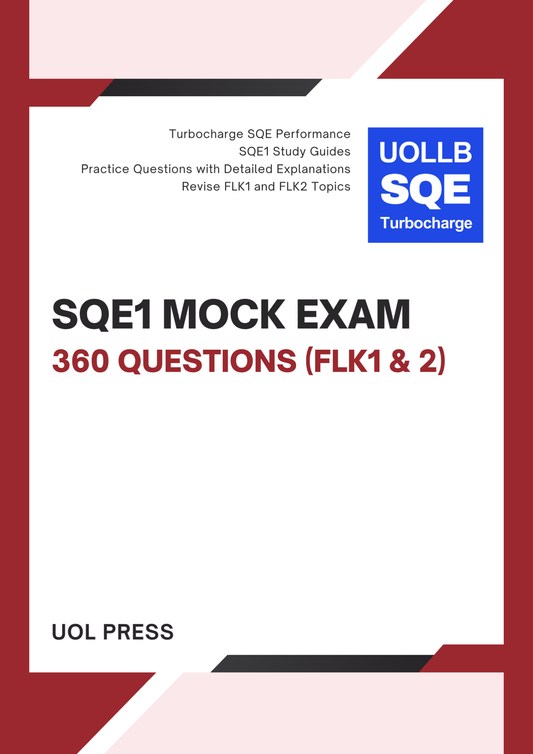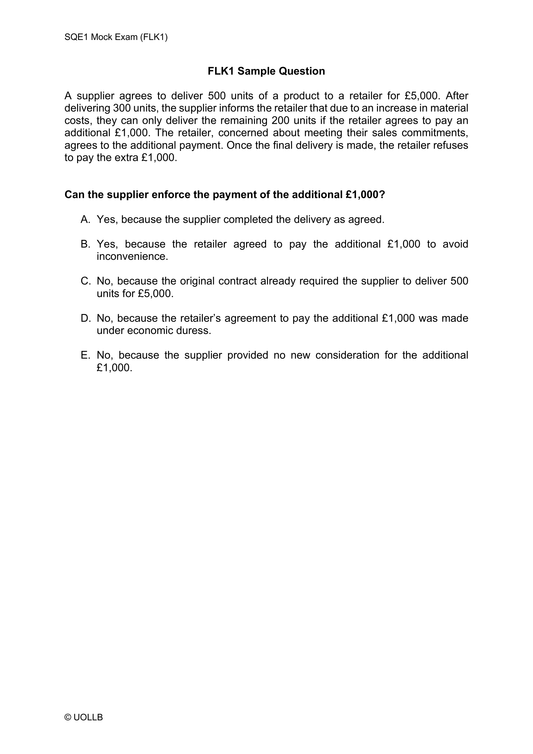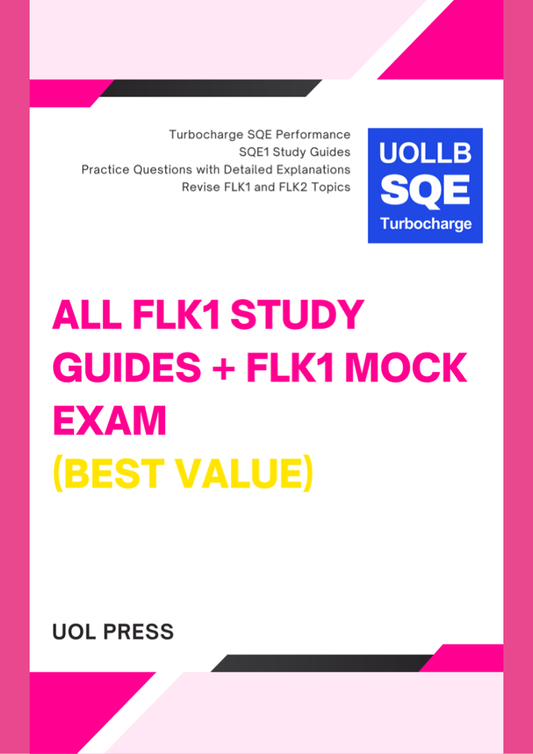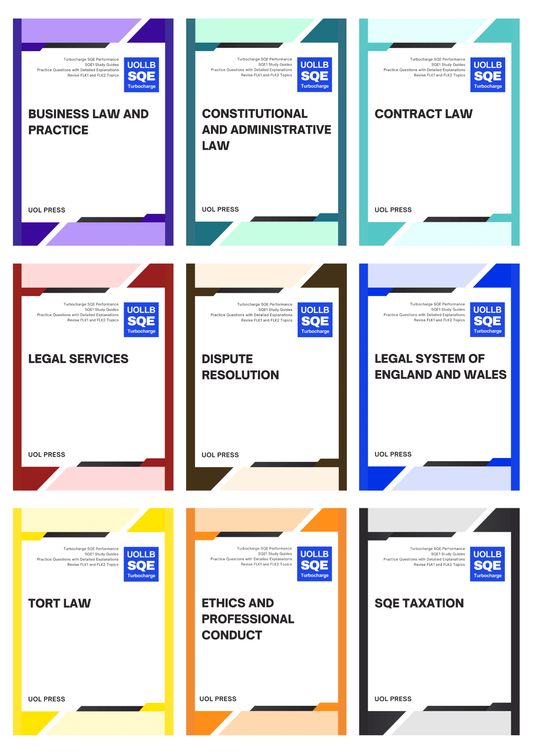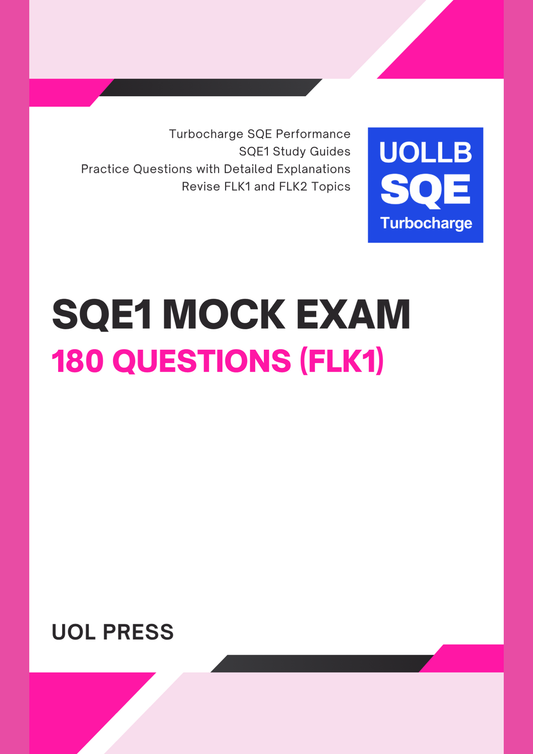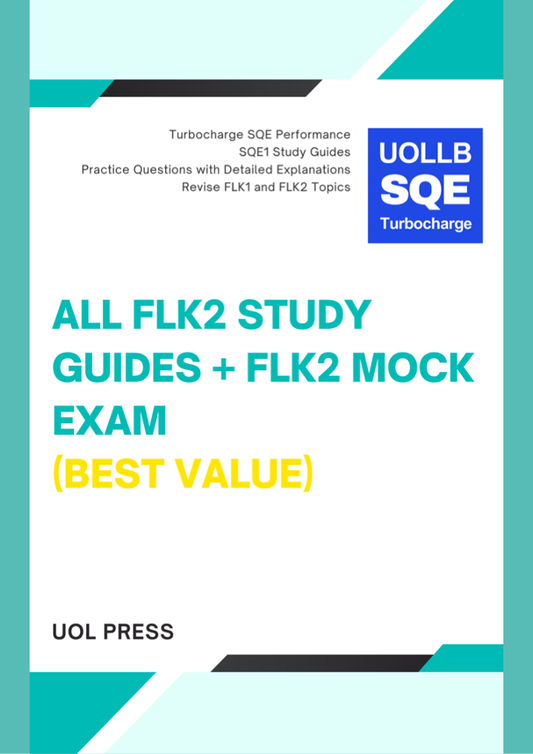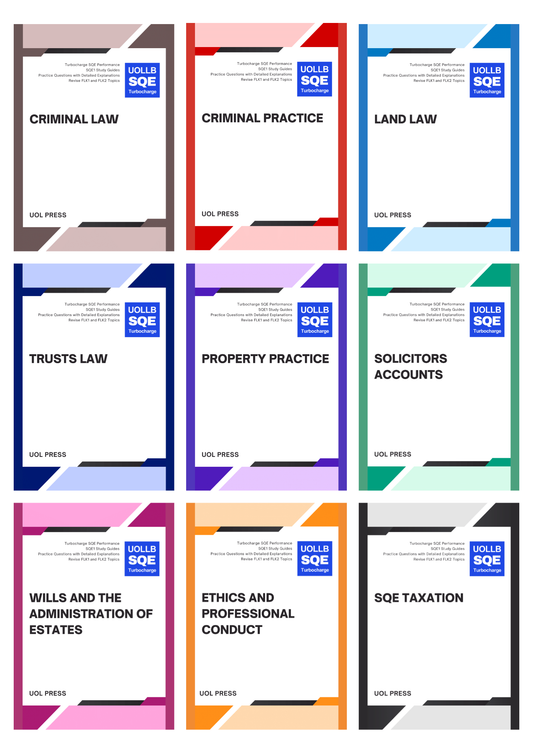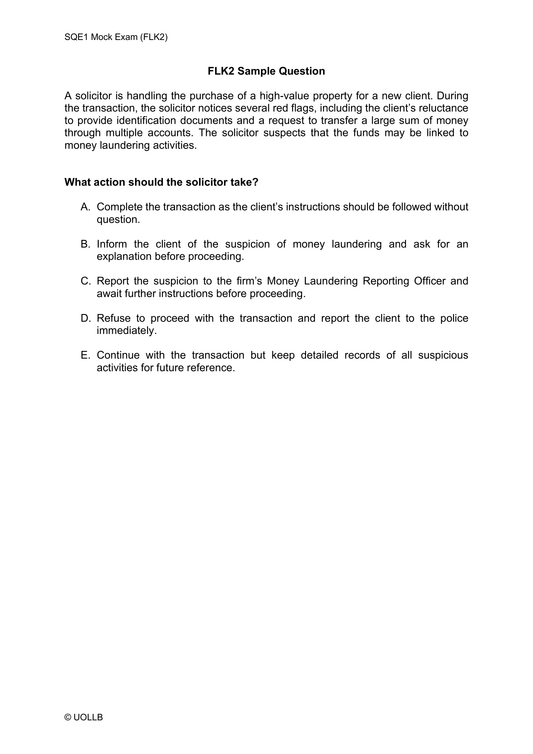SQE1 Assessment Areas
Share
The Solicitors Qualifying Examination (SQE) is a two-stage assessment system that aims to standardise and ensure high standards in the legal profession in England and Wales. Designed by the Solicitors Regulation Authority, the SQE measures your competency in core areas of law and practical legal skills, covering two sets of functioning legal knowledge (FLK1 and FLK2). The curriculum is comprehensive, encompassing various areas of substantive law, procedural rules, and ethics essential for solicitors.
SQE Business Law and Practice (FLK1)
This module focuses on the legal and practical aspects of running a business, including the formation, management, and dissolution of companies. Key areas covered include company formation procedures, types of business entities, shareholder rights, directors' duties, corporate governance, financing, and insolvency law. The module integrates the legal concepts governing partnerships, sole proprietorships, and limited liability companies, providing insights into each structure's advantages and disadvantages. You must also understand taxation and how it impacts businesses, as well as corporate insolvency procedures and personal bankruptcy. Ethical considerations and compliance with the SRA Principles are essential to business practice and are woven throughout the module.
SQE Constitutional and Administrative Law (FLK1)
This module is fundamental for understanding the framework governing the state, the relationship between the government and individuals, and the powers allocated across various branches. This module covers the rule of law, parliamentary sovereignty, separation of powers, and judicial review. You study the constitution's unwritten nature, with emphasis on key statutes, conventions, and landmark cases shaping the legal landscape. The module also addresses administrative law principles that allow individuals to challenge government actions. Understanding the structure and function of public authorities, human rights protections under the Human Rights Act 1998, and legal safeguards for procedural fairness are central to this subject.
SQE Contract Law (FLK1)
This module explores the principles that govern binding agreements, including how contracts are formed, performed, and terminated. You study essential elements, including offer, acceptance, consideration, and intention to create legal relations. The module covers contract terms, their interpretation, and remedies for breach, such as damages and specific performance. It examines the distinction between express and implied terms and highlights issues like misrepresentation, mistake, and duress. You are introduced to consumer protection laws, particularly in relation to unfair terms. Practical case examples and statutory provisions provide insights into contract management and enforcement in various scenarios.
SQE Criminal Law (FLK2)
This module provides an understanding of the fundamental principles governing criminal liability. It covers general elements of crime, including actus reus, mens rea, strict liability, and defences like self-defence, insanity, and intoxication. Major criminal offences such as theft, burglary, robbery, assault, and homicide are analysed, with a focus on case law to illustrate application. The module also explores concepts of corporate and accessory liability, as well as inchoate offences. An understanding of the Crown Prosecution Service's role, the Police and Criminal Evidence Act, and procedural safeguards is essential to navigate the criminal justice system effectively.
SQE Criminal Practice (FLK2)
This module complements Criminal Law by focusing on the procedural aspects of criminal litigation. It covers the stages of a criminal case, from arrest and detention to trial and sentencing. Key procedural rules under the Criminal Procedure Rules and the Police and Criminal Evidence Act are emphasised. You learn about court structures, roles of legal professionals, bail procedures, evidence admissibility, and trial preparation. Practical skills such as advocacy, negotiation, and ethical considerations are integral to this module. Understanding client representation, plea bargaining, and the appeals process equips you for effective practice in criminal litigation.
SQE Dispute Resolution (FLK1)
This module teaches the skills and knowledge required for civil litigation and alternative dispute resolution (ADR). It includes pre-trial procedures, filing claims, defences, case management, and the trial process. You learn about different courts, including the County Court and High Court, and the Small Claims Court's role. ADR methods, such as mediation and arbitration, are explored as alternatives to litigation. Emphasis is placed on client communication, managing expectations, negotiation techniques, and ethical obligations under the SRA Code of Conduct. This module prepares you for representing clients effectively in civil disputes.
SQE Ethics and Professional Practice (FLK1 and FLK2)
This module addresses the ethical obligations and professional standards solicitors must adhere to. It covers the SRA Principles, Solicitors' Accounts Rules, and the duty to act with integrity, independence, and confidentiality. This module emphasises the importance of client care, understanding conflicts of interest, and managing client funds responsibly. You explore scenarios involving ethical dilemmas, emphasising practical application of rules. Ethical decision-making, informed by professional standards and regulatory expectations, is a core aspect of this module, which underpins all areas of legal practice.
SQE Land Law (FLK2)
This module covers the rules and principles governing the ownership, use, and transfer of land. It includes proprietary interests such as freehold, leasehold, easements, covenants, and licenses. Key statutes, including the Land Registration Act 2002, are examined alongside concepts of adverse possession, mortgages, and leases. You explore the distinctions between legal and equitable rights, third-party rights, and priorities. The module teaches skills in identifying and analysing land interests, particularly during property transactions. Understanding the conveyancing process and statutory regulations is crucial for you to advise clients on land matters effectively.
SQE Legal Services (FLK1)
This module provides insight into the structure of the legal profession, focusing on solicitors' roles, regulation, and legal aid. You study the roles of various legal professionals, the role of regulatory bodies like the SRA, and the funding options available for clients, including conditional fee arrangements. Understanding the access to justice issues and government schemes for public funding is central to this module. It also includes knowledge of alternative business structures and the competitive environment within the legal market.
SQE Legal System of England and Wales (FLK1)
This module introduces the legal system's structure and key features, including the hierarchy of courts, the sources of law, and judicial precedent. You learn about the distinctions between common law and statutory law and the roles of different courts, including the Supreme Court and Court of Appeal. The module explores the judiciary's independence, the criminal and civil justice systems, and administrative justice. Familiarity with legal principles and foundational cases provides a basis for understanding subsequent legal studies.
SQE Property Practice (FLK2)
This module combines aspects of Land Law with practical conveyancing skills, covering the acquisition, sale, and leasing of residential and commercial properties. You learn about client instructions, conducting property searches, drafting documents, managing risks, and completing transactions. The module also addresses issues of title registration, mortgage arrangements, and landlord-tenant law. Ethical considerations, client care, and procedural compliance are highlighted so that you can be well-prepared for real-world property transactions.
SQE Solicitors Accounts (FLK2)
This module covers the rules governing client funds management under the Solicitors Accounts Rules. Topics include distinguishing between client and office accounts, handling client money, record-keeping, and compliance with regulatory requirements. Practical examples of common accounting errors and reconciliation processes are provided. You learn the importance of accuracy and transparency in handling funds, safeguarding clients' interests and maintaining professional integrity in financial management.
SQE Tort Law (FLK1)
This module focuses on the principles governing civil wrongs and remedies, covering areas like negligence, nuisance, defamation, and occupiers' liability. You study the requirements for establishing liability, such as duty of care, breach, causation, and remoteness of damage. The module includes defamation laws and economic torts, providing practical case scenarios to illustrate concepts. Remedies such as damages, injunctions, and statutory defences are examined, preparing you to advise on civil wrongs effectively.
SQE Trusts Law (FLK2)
This module examines the creation and administration of trusts, exploring trustee duties, beneficiaries' rights, and remedies for breach. You study different types of trusts, such as express, implied, and constructive trusts, as well as key principles like certainty of intention, subject matter, and beneficiaries. The module also addresses equitable remedies, fiduciary obligations, and constructive trusts in cases of unjust enrichment. Understanding trust management and the impact of legislation, such as the Trustee Act, is vital for advising clients on asset protection and wealth management.
SQE Wills and the Administration of Estates (FLK2)
Wills and the Administration of Estates covers the rules surrounding wills, probate, and estate administration. You learn about will drafting, revocation, intestacy rules, and grants of representation. The module emphasises the duties of executors and administrators, inheritance tax implications, and the distribution of assets. Ethical considerations, client communication, and compliance with legal formalities are crucial aspects of this subject, which enable solicitors to manage estate maters competently and in compliance with relevant probate regulations.
Our UOLLB SQE Turbocharge programme is designed to deliver focused and comprehensive preparation across all assessment areas, using structured and concise study materials that feature clear explanations, practical examples, and integrated case law. Our SQE Study Guides offer a detailed explanation of each assessment area, equipping you with the essential knowledge and skills needed to excel in the SQE.
SQE Business Law and Practice (FLK1)
This module focuses on the legal and practical aspects of running a business, including the formation, management, and dissolution of companies. Key areas covered include company formation procedures, types of business entities, shareholder rights, directors' duties, corporate governance, financing, and insolvency law. The module integrates the legal concepts governing partnerships, sole proprietorships, and limited liability companies, providing insights into each structure's advantages and disadvantages. You must also understand taxation and how it impacts businesses, as well as corporate insolvency procedures and personal bankruptcy. Ethical considerations and compliance with the SRA Principles are essential to business practice and are woven throughout the module.
SQE Constitutional and Administrative Law (FLK1)
This module is fundamental for understanding the framework governing the state, the relationship between the government and individuals, and the powers allocated across various branches. This module covers the rule of law, parliamentary sovereignty, separation of powers, and judicial review. You study the constitution's unwritten nature, with emphasis on key statutes, conventions, and landmark cases shaping the legal landscape. The module also addresses administrative law principles that allow individuals to challenge government actions. Understanding the structure and function of public authorities, human rights protections under the Human Rights Act 1998, and legal safeguards for procedural fairness are central to this subject.
SQE Contract Law (FLK1)
This module explores the principles that govern binding agreements, including how contracts are formed, performed, and terminated. You study essential elements, including offer, acceptance, consideration, and intention to create legal relations. The module covers contract terms, their interpretation, and remedies for breach, such as damages and specific performance. It examines the distinction between express and implied terms and highlights issues like misrepresentation, mistake, and duress. You are introduced to consumer protection laws, particularly in relation to unfair terms. Practical case examples and statutory provisions provide insights into contract management and enforcement in various scenarios.
SQE Criminal Law (FLK2)
This module provides an understanding of the fundamental principles governing criminal liability. It covers general elements of crime, including actus reus, mens rea, strict liability, and defences like self-defence, insanity, and intoxication. Major criminal offences such as theft, burglary, robbery, assault, and homicide are analysed, with a focus on case law to illustrate application. The module also explores concepts of corporate and accessory liability, as well as inchoate offences. An understanding of the Crown Prosecution Service's role, the Police and Criminal Evidence Act, and procedural safeguards is essential to navigate the criminal justice system effectively.
SQE Criminal Practice (FLK2)
This module complements Criminal Law by focusing on the procedural aspects of criminal litigation. It covers the stages of a criminal case, from arrest and detention to trial and sentencing. Key procedural rules under the Criminal Procedure Rules and the Police and Criminal Evidence Act are emphasised. You learn about court structures, roles of legal professionals, bail procedures, evidence admissibility, and trial preparation. Practical skills such as advocacy, negotiation, and ethical considerations are integral to this module. Understanding client representation, plea bargaining, and the appeals process equips you for effective practice in criminal litigation.
SQE Dispute Resolution (FLK1)
This module teaches the skills and knowledge required for civil litigation and alternative dispute resolution (ADR). It includes pre-trial procedures, filing claims, defences, case management, and the trial process. You learn about different courts, including the County Court and High Court, and the Small Claims Court's role. ADR methods, such as mediation and arbitration, are explored as alternatives to litigation. Emphasis is placed on client communication, managing expectations, negotiation techniques, and ethical obligations under the SRA Code of Conduct. This module prepares you for representing clients effectively in civil disputes.
SQE Ethics and Professional Practice (FLK1 and FLK2)
This module addresses the ethical obligations and professional standards solicitors must adhere to. It covers the SRA Principles, Solicitors' Accounts Rules, and the duty to act with integrity, independence, and confidentiality. This module emphasises the importance of client care, understanding conflicts of interest, and managing client funds responsibly. You explore scenarios involving ethical dilemmas, emphasising practical application of rules. Ethical decision-making, informed by professional standards and regulatory expectations, is a core aspect of this module, which underpins all areas of legal practice.
SQE Land Law (FLK2)
This module covers the rules and principles governing the ownership, use, and transfer of land. It includes proprietary interests such as freehold, leasehold, easements, covenants, and licenses. Key statutes, including the Land Registration Act 2002, are examined alongside concepts of adverse possession, mortgages, and leases. You explore the distinctions between legal and equitable rights, third-party rights, and priorities. The module teaches skills in identifying and analysing land interests, particularly during property transactions. Understanding the conveyancing process and statutory regulations is crucial for you to advise clients on land matters effectively.
SQE Legal Services (FLK1)
This module provides insight into the structure of the legal profession, focusing on solicitors' roles, regulation, and legal aid. You study the roles of various legal professionals, the role of regulatory bodies like the SRA, and the funding options available for clients, including conditional fee arrangements. Understanding the access to justice issues and government schemes for public funding is central to this module. It also includes knowledge of alternative business structures and the competitive environment within the legal market.
SQE Legal System of England and Wales (FLK1)
This module introduces the legal system's structure and key features, including the hierarchy of courts, the sources of law, and judicial precedent. You learn about the distinctions between common law and statutory law and the roles of different courts, including the Supreme Court and Court of Appeal. The module explores the judiciary's independence, the criminal and civil justice systems, and administrative justice. Familiarity with legal principles and foundational cases provides a basis for understanding subsequent legal studies.
SQE Property Practice (FLK2)
This module combines aspects of Land Law with practical conveyancing skills, covering the acquisition, sale, and leasing of residential and commercial properties. You learn about client instructions, conducting property searches, drafting documents, managing risks, and completing transactions. The module also addresses issues of title registration, mortgage arrangements, and landlord-tenant law. Ethical considerations, client care, and procedural compliance are highlighted so that you can be well-prepared for real-world property transactions.
SQE Solicitors Accounts (FLK2)
This module covers the rules governing client funds management under the Solicitors Accounts Rules. Topics include distinguishing between client and office accounts, handling client money, record-keeping, and compliance with regulatory requirements. Practical examples of common accounting errors and reconciliation processes are provided. You learn the importance of accuracy and transparency in handling funds, safeguarding clients' interests and maintaining professional integrity in financial management.
SQE Tort Law (FLK1)
This module focuses on the principles governing civil wrongs and remedies, covering areas like negligence, nuisance, defamation, and occupiers' liability. You study the requirements for establishing liability, such as duty of care, breach, causation, and remoteness of damage. The module includes defamation laws and economic torts, providing practical case scenarios to illustrate concepts. Remedies such as damages, injunctions, and statutory defences are examined, preparing you to advise on civil wrongs effectively.
SQE Trusts Law (FLK2)
This module examines the creation and administration of trusts, exploring trustee duties, beneficiaries' rights, and remedies for breach. You study different types of trusts, such as express, implied, and constructive trusts, as well as key principles like certainty of intention, subject matter, and beneficiaries. The module also addresses equitable remedies, fiduciary obligations, and constructive trusts in cases of unjust enrichment. Understanding trust management and the impact of legislation, such as the Trustee Act, is vital for advising clients on asset protection and wealth management.
SQE Wills and the Administration of Estates (FLK2)
Wills and the Administration of Estates covers the rules surrounding wills, probate, and estate administration. You learn about will drafting, revocation, intestacy rules, and grants of representation. The module emphasises the duties of executors and administrators, inheritance tax implications, and the distribution of assets. Ethical considerations, client communication, and compliance with legal formalities are crucial aspects of this subject, which enable solicitors to manage estate maters competently and in compliance with relevant probate regulations.
Our UOLLB SQE Turbocharge programme is designed to deliver focused and comprehensive preparation across all assessment areas, using structured and concise study materials that feature clear explanations, practical examples, and integrated case law. Our SQE Study Guides offer a detailed explanation of each assessment area, equipping you with the essential knowledge and skills needed to excel in the SQE.
